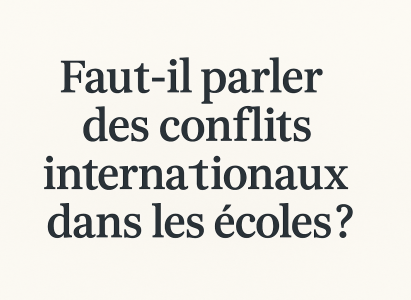It is essential to be clear about our positions and to uphold three basic principles which, in my view, are aligned with Swiss values:
1) A school is politically neutral. We are neither a war tribunal nor a political body. We do not take sides. We always stand for peace, dialogue, and living together harmoniously. If there is one reference point we must uphold, it is international law.
2) School is a place of learning , of sharing, reflecting, and, above all, of free and critical thinking. This does not mean putting teachers at risk by asking them to lead sensitive and emotional discussions without support. Instead, there should be clear pedagogical guidelines or training, and schools should consider inviting experts and journalists from the affected regions to present key elements: the foundations and geo-historical facts of current conflicts - without ever slipping into the promotion of ideologies or proselytizing. Without proper educational framing, students may turn to social media to try to make sense of complex events, often encountering partial or biased interpretations.
3) We must always stay connected with students and families affected by conflicts. We need to be attentive to their emotional and psychological wellbeing and particularly alert to stereotypes and prejudices that may spread. History shows that during times of international conflict, discriminatory acts and language tend to increase: we must be aware of this reality.
In short, classrooms must remain spaces for learning, not arenas for polemics. At the same time, 21st-century curricula must be relevant and prepare young people to navigate a complex world. We cannot stick our heads in the sand and leave students to discover the world around them on their own, without guidance or instruction. It is our responsibility to walk alongside them—that, after all, is the very root meaning of the word pedagogy.
Conrad Hughes, Director General (article originally published in French in La Tribune de Genève)
